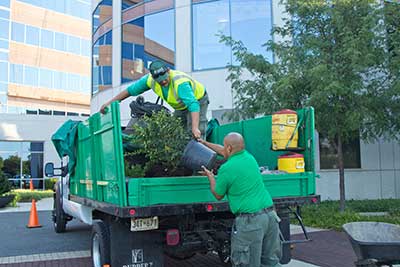As the Trump Administration moves into its second month, it’s becoming clear that the administration’s policies are going to create labor shortages in the landscape contracting industry this summer. While some (including me) thought Trump might not implement some of the more draconian policies he espoused during the campaign, he is demonstrating that his campaign promises should be taken literally and seriously.
H-2B visas
The first area to feel the squeeze of the new administration’s policies will be the H-2B guest-worker program. During the campaign, Trump spoke out against guest-worker visa programs, saying they take American jobs. He specifically attacked the H-1B visa program, used predominantly by technology companies for highly-skilled workers.
It remains to be seen specifically what the administration will do with guest-worker programs. The withdrawal of Andrew Puzder as the nominee for Trump’s labor secretary has slowed the administration’s plans for the Department of Labor and the programs it administers.
But the national associations representing landscape contractors, AmericanHort and the National Association of Landscape Professionals (NALP), who are closest to the situation, are very concerned. These associations are urging their members to meet with their Congressional representatives to educate them on the need for the H-2B program and how it does not take American jobs.
Given the heated campaign rhetoric of last fall, Congress now more than ever conflates the legal guest-worker programs with immigration and is reluctant to touch either.
Adding to the concern about the H-2B program is the six-month cap of 33,000 visas for the first half of fiscal 2017 was reached in January. With the economy back at what many economists consider full employment, the demand for H-2B visas by landscape contractors and others who use the program, such as the hospitality industry, has never been higher. Many landscape contractors will simply not get the H-2B visas they are seeking this season, if the program survives at all.
Immigration Enforcement
Another factor that will affect landscape contracting labor is the recent executive order (EO) on border security and immigration enforcement. This EO set enforcement priorities for the Immigration & Customs Enforcement (ICE) division of the Department Homeland Security. While the EO explicitly makes undocumented criminals a focus of enforcement, many believe that it significantly expands the scope of enforcement priorities to anyone who is in the U.S. illegally.
The president’s executive order has sent shock waves through the undocumented community. Further, a recent spate of raids by ICE officers that swept up and deported some who were not criminals, added to the angst among undocumented workers.
During the campaign, Trump talked frequently about a having a “deportation task force” to round up and deport all 11 million undocumented residents in the U.S. Although they haven’t called a task force, the Trump Administration recently announced plans to hire 10,000 additional ICE enforcement officers and 5,000 additional border patrol agents.
According to a 2015 Pew Research Center study of employment of undocumented workers in the U.S., almost a quarter of all workers in the landscape industry were undocumented in 2012. The landscape industry has one of the highest concentrations of undocumented workers of all the industry groups it studied.
Landscape contractors are liable to see much of their workforce disappear overnight as ICE steps up its enforcement against employers. At a minimum, ICE inspections will take time away from productive work.
Even if you don’t believe you employ undocumented workers, any disruption in the undocumented immigrant labor force will have a significant impact on your landscape contracting business as competition for the remaining documented workforce increases.
What Should You Do?
Watchful waiting, planning and action is what landscape contractors need to do now.
- If you use the H-2B program, you should visit in person with your Congressional delegation. Explain to them in plain terms what the H-2B program means to you and your regular employees. Ask them to reinstate the returning-worker provision. This measure would have the greatest immediate impact on H-2B visa availability.
- Make sure your worker documentation and I-9 files are in pristine condition and up-to-date. Because the landscape contracting industry hires so many undocumented workers, we have targets on our backs for ICE enforcement and inspections. Be ready.
- Think strategically about how you can get your work done with less labor. This is not a short-term problem that will soon go away. What can you automate? Can you shed some of your more labor-intensive work? What can you do to retain your best people as competition for labor increases?
Although all of President Trump’s policies are not fully implemented, this summer will be one of the toughest labor climates we have seen in awhile. Over the course of the season, I’ll be monitoring this situation and providing updates as the Trump policies become more concrete.
Photo: National Association of Landscape Professionals


